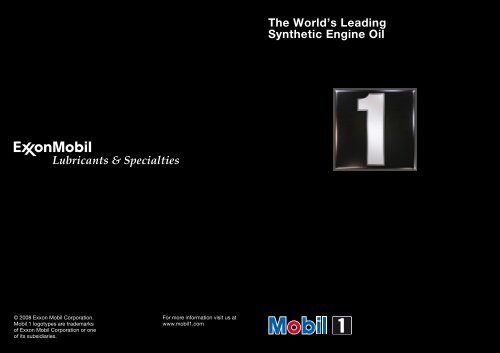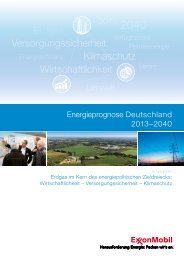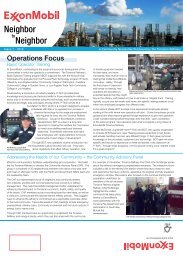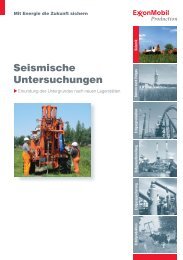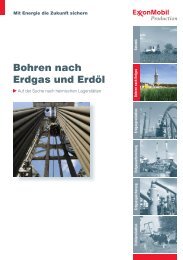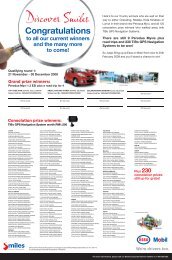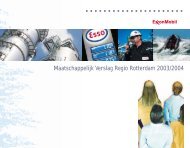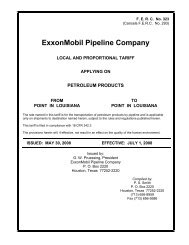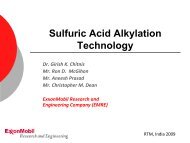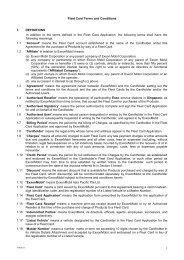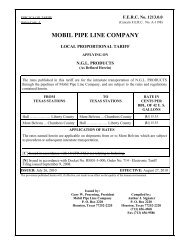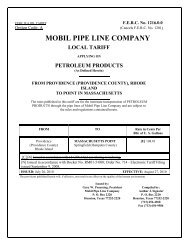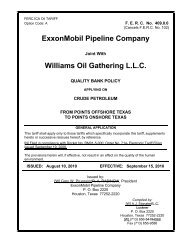Mobil 1: Proof Of Performance - ExxonMobil
Mobil 1: Proof Of Performance - ExxonMobil
Mobil 1: Proof Of Performance - ExxonMobil
You also want an ePaper? Increase the reach of your titles
YUMPU automatically turns print PDFs into web optimized ePapers that Google loves.
A Range <strong>Of</strong> Oils For All Vehicles Types<br />
<strong>Mobil</strong> 1 0W-40<br />
<strong>Mobil</strong> 1 5W-50<br />
<strong>Mobil</strong> 1 5W-30<br />
ULTIMATE ALL ROUND PERFORMANCE<br />
<strong>Mobil</strong> 1 0W-40 is a 100% fully synthetic motor oil formulated with the patented SuperSyn<br />
Anti-Wear technology. The <strong>Mobil</strong> 1 0W-40 grade delivers the viscosity required by many<br />
European car builders. Exceeding industry standards and the major leading builder requirements<br />
is the cornerstone of the performance reserve that keep <strong>Mobil</strong> 1 0W-40 performing well after<br />
conventional oils cannot. It provides outstanding protection, even during extended-use driving,<br />
coupled with excellent fuel economy performance.<br />
• Unsurpassed protection for high-tech multi-valve engines<br />
• Helps keep your engine running like new<br />
• Improves engine protection during the critical start-up period<br />
• Excellent high and low temperature performance<br />
• Proven low fuel consumption formula<br />
Meets API SM/CF, ILSAC GF-3 and ACEA A3/B3 & A3/B4. Approved against MB 229.3/229.5/<br />
225.8, BMW Longlife Oil 01, VW 502.00/503.01/505.00, Porsche Special Oil List & Porsche<br />
Cayenne V6 Longdrain, Opel GM-LL A-025 & Opel GM-LL B-025, DC DBL6674.31 & DC<br />
MS-10850.<br />
DRIVING EXCELLENCE<br />
<strong>Mobil</strong> 1 5W-50 is a 100% fully synthetic motor oil formulated with the patented SuperSyn<br />
Anti-Wear Technology. It provides outstanding protection, even during extended-use driving.<br />
• Outstanding engine cleanliness and wear protection<br />
• Helps keep your engine running like new<br />
• Exceptional high temperature protection<br />
• Improved protection against sludge and harmful deposits<br />
• Suitable for older and new vehicles<br />
Meets API SM/SL/SJ/CF and ACEA A3/B3 & A3/B4. Approved against<br />
MB 229.3, VW 505.00 and Porsche Special Oil List.<br />
NEWER VEHICLE FORMULA<br />
<strong>Mobil</strong> 1 5W-30 is a 100% fully synthetic motor oil formulated with the patented SuperSyn<br />
Anti-Wear Technology. The <strong>Mobil</strong> 1 5W-30 grade delivers the viscosity recommended for most<br />
General Motors vehicles and many Japanese car makers. <strong>Mobil</strong> 1 5W-30 is the approved and<br />
the first choice of premium car manufacturers, including Corvette. <strong>Mobil</strong> 1 5W-30 is an ILSAC<br />
GF-4 energy conserving viscosity that provides excellent all season protection. It is designed to<br />
provide outstanding wear protection,<br />
maintain excellent engine cleanliness, and the performance reserve to keep engines in newer<br />
cars running smooth and clean.<br />
• Viscosity grade recommended by major Japanese and US car makers for<br />
new vehicles<br />
• Helps keep your engine running like new<br />
• <strong>Of</strong>fers outstanding protection for high-tech multi-valve engines<br />
• Excellent high and low temperature performance<br />
• Exceptional cleanliness of engine parts<br />
Meets API SM/SL/SJ/CF, ILSAC GF-4, ACEA A1/B1 & A5/B5, GM 4718M & GM 6094M and<br />
DC MS-6395, Ford WSS-M2C929-A , HONDA RWC and HONDA/ACURA HTO-06.<br />
4
What Does Engine Oil Actually Do?<br />
The engine of your vehicle is a<br />
complex machine with hundreds<br />
of moving parts that operate<br />
under a wide range of<br />
temperatures and stresses.<br />
The oil you select needs to be<br />
equally capable of coping with<br />
these operating conditions to<br />
protect your engine against wear,<br />
corrosion, and the build-up of dirt<br />
and deposits.<br />
Rough Temperature<br />
Regimes<br />
200 - 350°C<br />
80 - 150°C<br />
50 - 80°C<br />
30 - 50°C<br />
Ambient - 140°C<br />
Prevent Valve Train Wear<br />
Prevent Rust<br />
Prevent Sludge and Varnish<br />
Keep Intakes Clean<br />
Prevent Ring Sticking<br />
Prevent Piston Deposits<br />
Prevent Bore Wear<br />
Prevent Bore Polishing<br />
Prevent Bearing Wear<br />
Control Viscosity Increase<br />
Keep Oil Screen Clean<br />
Reduce Oil Consumption<br />
Prevent Sludge<br />
What Is A Synthetic?<br />
There are two basic types of<br />
lubricant available.<br />
1. Conventional mineral oils<br />
which are the traditional kind,<br />
and still the most widely used<br />
2. Synthetic lubricants<br />
which are steadily growing<br />
in popularity.<br />
Synthetics<br />
Conventional<br />
Both types are made from the<br />
same crude oil that comes out<br />
of the ground.<br />
In simple terms, the difference<br />
is that synthetic oils are made<br />
using more advanced refining<br />
processes, and hence are of a<br />
higher purity and quality than<br />
the conventional mineral oils.<br />
This is not only removes more<br />
of the impurities from the<br />
crude oil, it actually enables<br />
the individual molecules<br />
making up the oil to be<br />
tailored more closely to the<br />
More uniform molecules = less friction<br />
Inconsistent molecule size = more friction<br />
demands of modernengines.<br />
The “made to measure”<br />
molecules provide much<br />
higher levels of protection and<br />
all round performance.<br />
5 6
What’s So Good About Synthetic Lubricants?<br />
Synthetic oils have been<br />
developed specifically to cope<br />
with extreme conditions found<br />
within modern engines.<br />
In particular, they’re much<br />
more free-flowing than<br />
traditional mineral oils. The<br />
biggest benefit of this is<br />
greatly increased engine<br />
protection. When an engine is<br />
first started, a mineral oil<br />
takes some time to circulate,<br />
allowing friction between<br />
un-lubricated parts to cause<br />
wear. In contrast, a synthetic<br />
lubricant starts circulating<br />
straight away, protecting every<br />
moving part within the engine.<br />
Synthetic oils can also<br />
significantly improve fuel<br />
economy. During the warm up<br />
period of a typical car<br />
journey,mineral oils are thicker<br />
and slower moving, making<br />
the engine less efficient and<br />
more thirsty.<br />
Because synthetics get to<br />
work much quicker, the engine<br />
reaches peak operating<br />
efficiency that much sooner.<br />
Another advantage of<br />
synthetics is that they’re<br />
cleaner and “greener” –<br />
helping to cut engine<br />
emissions when compared to<br />
conventional oils.<br />
Conventional oils also contain<br />
much greater amounts of<br />
impurities, such as sulfur,<br />
Attribute of<br />
Synthetic Basestock Feature Benefit<br />
Higher Viscosity Index Prevents oil becoming too thick at<br />
low temperatures and too thin at<br />
high temperatures<br />
reactive and unstable<br />
hydrocarbons, and other<br />
undesirable contaminants that<br />
cannot be completely<br />
removed by conventional<br />
refining of crude oil.<br />
In all these important respects,<br />
synthetic lubricants easily<br />
outperform mineral oils.<br />
Reduces engine wear, especially at<br />
temperature extremes<br />
Low Temperature <strong>Performance</strong> Keeps oil flow at starting up Oil reaches critical engine parts more<br />
quickly to reduce engine wear<br />
Lower Volatility Reduces oil burn off Reduces oil consumption and need<br />
for frequent top-off<br />
Lower Traction Due to the more consistent<br />
molecular structure of synthetics,<br />
there is less friction within the fluid<br />
Increased Oxidative Stability Resists breakdown and attack<br />
from oxygen molecules<br />
Leads to greater efficiency and lower<br />
oil temperatures<br />
Slows down the rate of oil thickening and<br />
minimizes engine deposits and varnish<br />
Discover the <strong>Mobil</strong> 1 Difference<br />
Unrivaled Product <strong>Performance</strong>:<br />
The high performance synthetic fluids that are used in <strong>Mobil</strong> 1 are<br />
just one of the reasons for unrivalled product performance. Here’s<br />
what else we do to bring you consistently superior products:<br />
• We have over three decades of synthetic research experience.<br />
• We test our formulations to the extreme to ensure they’ll<br />
provide the performance you can depend on.<br />
• Our <strong>Mobil</strong> 1 formulations are proprietary and exclusive.<br />
• <strong>Mobil</strong> 1 is chosen by more OEMs than any other oil brand in<br />
the world.<br />
• We consistently bring new innovations to the market to meet<br />
the needs of modern engines.<br />
7 8
Discover the <strong>Mobil</strong> 1 Difference<br />
<strong>Mobil</strong> 1 with SuperSyn<br />
uses approximately 20<br />
different components from<br />
around the world to make<br />
each <strong>Mobil</strong> 1 product.<br />
9<br />
Friction Modifier<br />
Low Temperature<br />
Zinc/Phosphorous<br />
Anti-Wear Additive<br />
High Temperature<br />
Zinc/Phosphorous<br />
Anti-Wear Additive<br />
Seal Swell Agent<br />
Extreme Pressure<br />
Additive<br />
Long Term Antioxidant<br />
Shear Stable Viscosity<br />
<strong>Mobil</strong> 1 is always<br />
formulated with high<br />
performance base stocks,<br />
designed to provide<br />
optimum low and high<br />
Synthetic Fluid I<br />
Synthetic Fluid II<br />
Synthetic Fluid III<br />
Synthetic Fluid IV<br />
temperature protection in<br />
each viscosity grade. Our<br />
advanced synthetic fluids<br />
are expertly combined to<br />
enhance high temperature<br />
cleanliness and<br />
anti-wear performance.<br />
High Temperature<br />
Ashless Dispersant<br />
Low Temperature<br />
Ashless Dispersant<br />
Defoamant<br />
Short Term Antioxidant<br />
Medium Temperature<br />
Detergent<br />
Low Temperature<br />
Detergent<br />
High Temperature<br />
Detergent<br />
<strong>Mobil</strong> 1: <strong>Proof</strong> of <strong>Performance</strong><br />
We test our formulations to<br />
the extreme to ensure they’ll<br />
provide the best performance.
<strong>Mobil</strong> 1: <strong>Proof</strong> <strong>Of</strong> <strong>Performance</strong><br />
Cold Temperature<br />
<strong>Performance</strong><br />
11<br />
Time (Seconds)<br />
In cold weather, if the oil is not<br />
pumped quickly, the engine<br />
may take longer to fire, and it<br />
will take longer for the engine<br />
to achieve full oil pressure. The<br />
test simulates low temperature<br />
pumpability and cold starting.<br />
This can result in poor<br />
lubrication and a higher rate of<br />
Deposit Control Oils of lower oxidative and<br />
thermal stability will cause<br />
greater deposit formation. As<br />
piston deposits increase,<br />
engine efficiency decreases.<br />
The test simulates high<br />
temperature piston deposit<br />
formation. The test oil is<br />
25<br />
20<br />
15<br />
10<br />
5<br />
0<br />
Time to Reach<br />
Full Oil Pressure (-32°C)<br />
engine wear. Vehicle engines<br />
are filled with test oil, then<br />
parked overnight in a cold<br />
chamber. In the morning, the<br />
ignition key is turned and the<br />
total time taken to reach full oil<br />
pressure at the furthest point<br />
in the engine is recorded.<br />
Test Vehicles: 2006 VW Golf 2006 Ford Focus<br />
Better<br />
Data is based on testing<br />
with both vehicles.<br />
heated to 285°C and directed<br />
onto a rapidly spinning (2,500<br />
rpm) aluminum disc which is<br />
heated to 330°C. The test<br />
duration is 3 hours. At the end<br />
of test, the oil is assigned a<br />
cleanliness merit rating out<br />
of 100.<br />
The use of <strong>Mobil</strong> 1 enabled<br />
the engine to achieve full oil<br />
pressure up to 15 seconds<br />
quicker than some other oils<br />
we tested.<br />
<strong>Mobil</strong> 1 better resists<br />
high temperature<br />
deposit formation than<br />
some other leading fully<br />
synthetic and<br />
semi-synthetic oils.<br />
<strong>Mobil</strong> 1 0W-40<br />
Market General<br />
Fully Synthetic 5W-40<br />
Market General<br />
Semi-Synthetic 10W-40<br />
Piston Cleanliness<br />
Piston Cleanliness<br />
<strong>Mobil</strong> 1 0W-40<br />
Rating = 90 / 100<br />
Piston Rating (Relative)<br />
100<br />
80<br />
60<br />
40<br />
20<br />
0<br />
Some of the engine tests we<br />
run simulate extremely severe<br />
conditions. This particular<br />
engine test measures oil<br />
thickening and piston deposits<br />
in simulated high speed<br />
driving in very hot weather. Oil<br />
temperature reached 150°C<br />
for 100 hours.<br />
Better<br />
<strong>Mobil</strong> 1 Market General Fully Synthetic<br />
Market General Fully<br />
Synthetic Rating = 63 / 100<br />
Market General Semi<br />
Synthetic Rating = 49 / 100<br />
<strong>Mobil</strong> 1 can help keep your<br />
engine cleaner under high<br />
temperature conditions.<br />
Relevant Partof Engine:<br />
Pistons<br />
<strong>Mobil</strong> 1 0W-40<br />
Market General<br />
Fully Synthetic 5W-40<br />
12
<strong>Mobil</strong> 1: <strong>Proof</strong> <strong>Of</strong> <strong>Performance</strong><br />
Improved Wear<br />
<strong>Performance</strong><br />
13<br />
8.0<br />
6.0<br />
4.0<br />
2.0<br />
Improved Fuel<br />
Economy <strong>Performance</strong><br />
0<br />
8.0<br />
6.0<br />
4.0<br />
2.0<br />
0<br />
Oils meeting higher<br />
performance specification<br />
such as MB 229.5 offer<br />
improved wear protection.<br />
Reduced levels of wear ensure<br />
a healthier engine and longer<br />
engine life. Certain engine oil<br />
specifications require a<br />
Comparative Wear <strong>Performance</strong> Limits<br />
Oils meeting the toughest<br />
specifications such as MB<br />
229.5 must provide improved<br />
fuel economy compared to<br />
less stringent specifications<br />
such as MB 229.1. Certain<br />
engine oil specifications<br />
require a fuel economy test<br />
minimum passing wear<br />
requirement to be achieved.<br />
More demanding<br />
specifications set tougher<br />
limits (e.g. the Mercedes-Benz<br />
specification system uses<br />
tiered wear limits for certain<br />
engine tests).<br />
Better<br />
Comparative Fuel Economy Limits<br />
limit to be achieved in order to<br />
meet the requirements of that<br />
specification. More demanding<br />
specifications set tougher<br />
limits (e.g. the Mercedes-Benz<br />
specification system uses<br />
tiered fuel economy limits).<br />
Better<br />
<strong>Mobil</strong> 1 is designed to offer<br />
improved wear protection.<br />
Relevant Part of Engine:<br />
Cylinder<br />
<strong>Mobil</strong> 1 0W-40 is<br />
designed to offer<br />
improved fuel economy.<br />
Relevant Part of Engine:<br />
Cylinder<br />
<strong>Mobil</strong> 1 0W-40<br />
Market General<br />
Fully Synthetic 5W-40<br />
Market General<br />
Semi-Synthetic 10W-40<br />
Get The Sludge Out<br />
American Vehicle<br />
Results<br />
*Testing done in a controlled environment<br />
To test* the cleaning power of<br />
<strong>Mobil</strong> 1, researchers tested a<br />
European performance vehicle<br />
and an American vehicle that<br />
had been run with<br />
conventional oil, then switched<br />
to <strong>Mobil</strong> 1. After 14,000 miles<br />
of driving with <strong>Mobil</strong> 1 at the<br />
recommended oil drain<br />
interval, the European vehicle<br />
returned to near new levels of<br />
cleanliness. The American<br />
Before<br />
After<br />
vehicle experienced even<br />
greater improvements from<br />
<strong>Mobil</strong> 1. After the equivalent of<br />
tens of thousands of miles of<br />
sludge build up, the camshaft<br />
hold downs were many times<br />
cleaner after regular oil<br />
change intervals with <strong>Mobil</strong> 1.<br />
The rocker covers were also<br />
much cleaner after running<br />
<strong>Mobil</strong> 1.<br />
Photographs demonstrate<br />
dramatic visual cleanliness<br />
improvement after 21,000<br />
miles. <strong>Mobil</strong> 1 can offer<br />
exceptional cleaning power<br />
for dirty engines.<br />
Relevant Part of Engine:<br />
Top Deck<br />
14
What About <strong>Mobil</strong> 1’s <strong>Proof</strong> <strong>Of</strong> <strong>Performance</strong> Outside The Laboratory?<br />
But the proof doesn’t stop<br />
there. We continually test our<br />
formulations in the real world,<br />
pushing vehicles filled with<br />
<strong>Mobil</strong> 1 to extremes to ensure<br />
they provide the performance<br />
you can depend on.<br />
In 1990, <strong>Mobil</strong> conducted an<br />
extraordinary experiment with<br />
<strong>Mobil</strong> 1 - the Million Miles<br />
Test. At <strong>Mobil</strong>’s research<br />
center in the United States, a<br />
new BMW 325i was filled with<br />
<strong>Mobil</strong> 1, and then run<br />
continuously day and night,<br />
for the next four years,<br />
stopping only for routine<br />
maintenance and servicing.<br />
After the equivalent of a million<br />
miles of hard driving, the<br />
engine was stripped and<br />
examined. They couldn’t find<br />
any sign of significant wear.<br />
Not only was the engine still in<br />
excellent working condition,<br />
most parts were still within<br />
BMW’s tolerance for new.<br />
In 2003, nine volunteers from<br />
the Drive Around the World<br />
Expedition began a 16-month<br />
intercontinental journey. They<br />
traveled 28,000 miles, before<br />
changing the engine oil. They<br />
endured more dust in a day<br />
than most cars see in a year &<br />
temperature extremes.<br />
Ranging from 53° Celsius in<br />
the Mojave Desert, to -50°<br />
Celsius in Siberia. Without<br />
<strong>Mobil</strong> 1 motor oil, the vehicles<br />
wouldn’t have been able to<br />
stand up to the extremes.<br />
In 2006, the world’s fastest<br />
UTE (HSV Z Series Maloo R8<br />
UTE) set off from Melbourne<br />
and endured a challenging<br />
37,000 km trek around<br />
Australia. They traveled on all<br />
kinds of roads for 6 months<br />
without a single oil change. On<br />
the completion of the journey<br />
the engine was inspected and<br />
found clean as a whistle.<br />
In short, most synthetic oils<br />
can provide a high level of<br />
engine protection. But <strong>Mobil</strong> 1<br />
has continually proved it can<br />
keep your engine performing<br />
‘like new’ in even the most<br />
demanding conditions.<br />
<strong>Mobil</strong> 1 Is Chosen By More Car Builders Than Any Other Oil Brand In The World.<br />
All these manufacturers have extremely demanding engine oil specifications. <strong>Mobil</strong> 1 meets and often<br />
exceeds these standards, making it the factory-fill lubricant of choice.<br />
• Acura RDX<br />
• Aston Martin<br />
• Bentley Vehicles<br />
• Cadillac CTS, CTS-V, Escalade, XLR, XLR-V, SRX and STS and STS-V<br />
• Chevrolet Corvette C6 and Z06<br />
• Chevrolet TrailBlazer SS<br />
• Chrysler 300C SRT-8<br />
• Chevrolet Cobalt SS<br />
• Dodge Charger SRT-8, and Magnum SRT-8<br />
• Holden Special Vehicles<br />
• Jeep Grand Cherokee SRT-8<br />
• Mercedes-AMG Vehicles<br />
• Mercedes-Benz SLR McLaren<br />
• Mitsubishi Evolution<br />
• Nissan GT-R<br />
• Pontiac Solstice GXP<br />
• All Porsche Vehicles<br />
• Saturn Ion Red Line and Saturn Sky Red Line<br />
• Dodge Viper<br />
15 16
Frequently Asked Questions<br />
1. What?s the difference<br />
between a fully synthetic and<br />
a semi-synthetic<br />
engine oil?<br />
All engine oils are made up of<br />
base oils and additives. Fully<br />
synthetic engine oils contain<br />
100% non-conventional,<br />
high-performance fluids.<br />
Semi-synthetic oils (also called<br />
“blends”) contain a smaller<br />
percentage of these high<br />
performance fluids in<br />
combination with conventional<br />
oil. <strong>Mobil</strong> 1 is a fully synthetic<br />
motor oil.<br />
2. What makes synthetic<br />
engine oil superior to<br />
conventional engine oil?<br />
The performance of synthetic<br />
oils, and in particular <strong>Mobil</strong> 1,<br />
is more robust, especially in<br />
terms of low temperature<br />
pumping and flow, and high<br />
temperature stability and<br />
protection against deposits.<br />
These attributes translate<br />
directly into less engine wear<br />
and longer engine life.<br />
Conventional oils also contain<br />
much greater amounts of<br />
impurities, such as sulfur,<br />
reactive and unstable<br />
hydrocarbons, and other<br />
undesirable contaminants that<br />
cannot be completely removed<br />
by conventional refining of<br />
crude oil.<br />
3. Is it true that new engines<br />
need break-in periods using<br />
conventional engine oil?<br />
That is a myth. In the past,<br />
engine break-in was necessary<br />
to remove any metal flashing<br />
(called swarf) or abrasive<br />
material left inside the engine<br />
after machining, as well as to<br />
allow the valves and rings to<br />
“seat” properly. Today’s<br />
engines are built with much<br />
tighter tolerances, improved<br />
machining and under cleaner<br />
conditions compared to the<br />
engines of 10 or 20 years ago.<br />
Current engine manufacturing<br />
technology does not require a<br />
break-in period using<br />
petroleum-based engine oils.<br />
In fact, <strong>Mobil</strong> 1 is chosen as<br />
the standard factory fill for<br />
many leading vehicle<br />
manufactures such as<br />
Porsche, Mercedes Benz,<br />
Cadillac, Aston Martin and<br />
many more. So <strong>Mobil</strong> 1 is often<br />
used in a car, even before you<br />
drive it off the showroom floor.<br />
4. Is it okay to mix<br />
conventional oil with<br />
<strong>Mobil</strong> 1?<br />
Yes, <strong>Mobil</strong> 1 is fully<br />
compatible with conventional<br />
engine oils, semi-synthetic<br />
engine oils and other synthetic<br />
engine oils should it be<br />
necessary to mix them.<br />
However, the superior<br />
performance of <strong>Mobil</strong> 1 will be<br />
reduced by diluting it.<br />
5. Is <strong>Mobil</strong> 1 suited to<br />
“stop-start’ driving?<br />
If most of your driving consists<br />
of short journeys like the quick<br />
trip to work, the school run, or<br />
down to the stores, your<br />
engine hardly has time to<br />
warm up before it is turned off<br />
again. So to save engine wear,<br />
you need outstanding cold<br />
start protection. In tests, it’s<br />
been proved time and again<br />
that <strong>Mobil</strong> 1 still flows freely at<br />
temperatures as low as<br />
negative 50 deg C and on start<br />
up, it can reach the moving<br />
parts of the engine 15 seconds<br />
faster than most<br />
conventional oils.<br />
6. Is <strong>Mobil</strong> 1 suited to long<br />
haul motorway driving?<br />
If you often drive long<br />
distances at high speeds, your<br />
engine will get extremely hot<br />
and, needless to say, you need<br />
good fuel economy.<br />
The Million Miles Test & the<br />
Drive Around the World proves<br />
that no matter how long the<br />
journey, you can rely on <strong>Mobil</strong><br />
1 to keep your engine running<br />
more efficiently and performing<br />
at its peak - therefore using<br />
less fuel.<br />
7. Is <strong>Mobil</strong> 1 suited to<br />
performance driving?<br />
Tried and tested at the highest<br />
levels of motor sports, the<br />
World’s Leading Synthetic<br />
Engine Oil is simply the only<br />
choice for car enthusiasts. If<br />
performance really matters to<br />
you, then you must be placing<br />
extreme demands upon<br />
your engine.<br />
As the McLaren F1 team knows,<br />
using the right lubricant can<br />
make a significant difference in<br />
terms of increased power<br />
output. What’s more, you’ll<br />
enjoy the reassurance of<br />
knowing that your engine has<br />
the ultimate protection however<br />
hard you drive it.<br />
8. What does “multigrade”<br />
refer to?<br />
Multigrades are multi-viscosity<br />
oils that have been designed<br />
to perform over a wider range<br />
of temperatures than older<br />
‘monograde’ oils. Multigrade<br />
oils are identified by two SAE<br />
(Society of Automotive<br />
Engineers) grade designations<br />
e.g. 0W-40. The lower number<br />
in front of the ‘W’ indicates the<br />
oil’s viscosity in cold<br />
temperatures – the lower the<br />
number the better the oil’s<br />
ability to flow. Similarly, the<br />
second part of the viscosity<br />
grade indicates the oil’s<br />
viscosity in hot temperatures -<br />
the higher the number the<br />
thicker the oil film.<br />
9. Can I use any of the <strong>Mobil</strong><br />
1 products in my vehicle,<br />
irrespective of its age?<br />
Since every <strong>Mobil</strong> 1 product<br />
has been formulated to<br />
provide exceptional<br />
performance and protection,<br />
you could use any of our <strong>Mobil</strong><br />
1 products with confidence,<br />
whatever the age of your<br />
vehicle. However, you may not<br />
experience all the benefits that<br />
could be provided by using a<br />
product optimized for your<br />
particular age and design of<br />
engine. Always consult your<br />
owner’s manual to check the<br />
recommended specification for<br />
your vehicle.<br />
The Power <strong>Of</strong> Innovation<br />
Today, after four decades of refining and<br />
expanding our innovative technology, <strong>Mobil</strong> 1 is<br />
the world’s leading synthetic motor oil.<br />
17 18<br />
1973<br />
Europe &<br />
Japan<br />
1996<br />
Europe, Asia<br />
& Australia<br />
1973<br />
Germany &<br />
Austria<br />
1996<br />
USA, Canada<br />
& Mexico<br />
1974<br />
USA<br />
Forty years ago, researchers at <strong>Mobil</strong><br />
faced a daunting challenge from the<br />
U.S. military. As planes returned to<br />
their aircraft carriers, cold in-flight<br />
temperatures froze the wheelbearing<br />
grease in the landing gear,<br />
leading to bearing failure. <strong>Mobil</strong><br />
devised a way of synthesizing<br />
grease that retained its lubricating<br />
characteristics over a wider range of<br />
temperatures than was possible with<br />
mineral-based grease.<br />
In the late 1960s, <strong>Mobil</strong> developed<br />
synthetic engine oil that lubricated<br />
diesels powering oil rigs in Alaska at<br />
temperatures as low as -40°C. <strong>Mobil</strong><br />
discovered that the innovative<br />
synthetic oils delivered advantages<br />
1997<br />
Japan & Asia<br />
1983<br />
USA, Canada<br />
& Mexico<br />
1998<br />
USA, Canada<br />
& Mexico<br />
1992<br />
USA & Canada<br />
2002<br />
Launched<br />
<strong>Mobil</strong> 1<br />
SuperSyn<br />
in every engine aspect: longterm<br />
durability, fuel consumption,<br />
increased power, enhanced<br />
lubrication over wide temperature<br />
ranges and engine cleanliness. In<br />
1974, <strong>Mobil</strong> 1 synthetic engine oil<br />
was born.<br />
Originally released to safely enhance<br />
fuel-efficiency, later formulations<br />
aimed to provide protection over the<br />
widest range of temperatures (<strong>Mobil</strong><br />
Extreme Formula 0W-30). Another<br />
improved engine wear protection<br />
and lowered phosphorus levels for<br />
extended catalytic converter life<br />
(Advanced Formula <strong>Mobil</strong> 1). <strong>Mobil</strong> 1<br />
was reformulated in 2002 to contain<br />
the SuperSyn anti-wear system.<br />
1994-5<br />
Mid-East<br />
2008<br />
Russia<br />
& Ukraine


